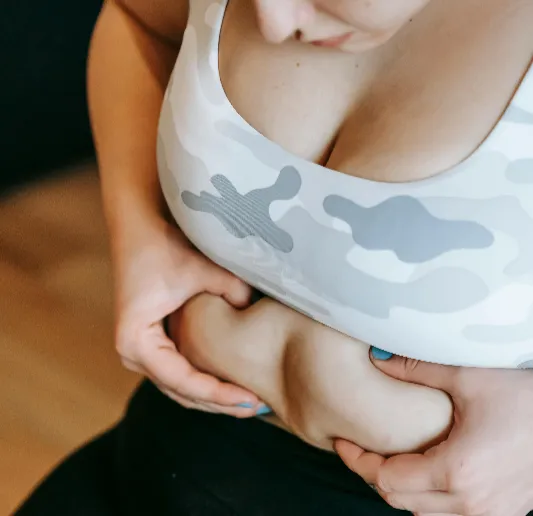Ayurveda for PCOS: how natural treatments can balance your hormones

Some of the signs and symptoms of PCOS are obesity and infertility.
Image: Andres Ayrton/Pexels.com
Polycystic Ovary Syndrome (PCOS) is a common endocrine disorder affecting approximately 6 to 13% of women of reproductive age worldwide. It can develop during adolescence or soon after menarche; around 15 to 20% of infertile women have a PCOS diagnosis.
Conventional treatments involve hormonal therapy if they are trying to conceive; oral contraceptive pills are often prescribed to regulate menstrual cycles, reduce androgen levels, and manage symptoms like acne and hirsutism, or metformin to address insulin resistance.
Ayurvedic medicine offers a holistic and natural approach aimed at addressing the root cause of hormonal imbalance and metabolic dysfunction. PCOS can significantly impact fertility, metabolic health, psychological, and emotional well-being.
The following signs and symptoms characterise this disorder
- Irregular menstrual cycles
- Menstrual abnormalities in the form of less menstrual bleeding (hypomenorrhea), absence of menstrual bleeding (amenorrhea), or abnormally high and irregular bleeding (menorrhagia, metrorrhagia, and menometrorrhagia)
- Hyperandrogenism and hair loss (due to excess male hormones)
- Infertility
- Acne
- Obesity
- Blackish discolouration of the skin around the nape of the neck, inner thighs, and axilla (Acanthosis nigricans)
PCOS is diagnosed using the Rotterdam criteria, which requires at least two of the following:
- Irregular or absent ovulation (oligo-ovulation or anovulation).
- Clinical or biochemical signs of hyperandrogenism (for example, hirsutism, acne, or elevated testosterone levels).
- Polycystic ovaries on ultrasound (12 or more follicles in one ovary or increased ovarian volume).
Pathophysiology of PCOS in Ayurveda
According to Dr Remya Krishnan’s publication on Ayurvedic Gynaecology and Maternity Care (2021): A healthy and mature follicle forms when it receives the optimal level of nourishment (rasasneha), provided by nourishing substances that support its growth, combined with a balanced level of estrogen.
This stage is predominantly influenced by Kapha Dosha, which mirrors anabolic reactions in the body by promoting lubrication, delivering essential nutrients, and enhancing the follicle's strength and vitality. However, conditions like PCOS can develop due to excessive consumption of heavy-to-digest, oily foods, leading to over-nourishment within the follicle.
This excess impairs hormonal function, disrupting the maturation process and resulting in the development of a single follicle instead of multiple healthy ones.
Ayurvedic guidelines for the treatment of PCOS
- Langhana (fasting): This aspect of treatment reduces excess bulk and heaviness in the body. Excess Kapha and Meda (fat tissue) contribute to PCOS symptoms like weight gain and sluggish metabolism. Fasting includes eating warm, light, and easily digestible meals, which help reduce this accumulation, improving Agni (digestive fire) and alleviating follicular over-nourishment.
- Rukshana (drying): This counters the oily, unctuous nature of rasasneha and Kapha dominance in PCOS. Using dry, astringent herbs or certain ayurvedic therapies, which help decrease excess sebum, fat, and fluid retention, aiding in balancing hormonal activity and reducing cyst formation.
- Chedana (cutting): This involves the use of sharp-acting herbs to break down and eliminate Ama (metabolic toxins) and excess Kapha lodged in the reproductive tissues. This helps clear blockages in the Artavavaha srotas (reproductive channels), supporting better follicular maturation.
- Lekhana (scraping): Lekhana therapies involve the use of scraping herbs that focus on adipose tissue. This helps address insulin resistance and obesity, common in PCOS, and restores hormonal balance.
- Srotoshodhana (cleansing the reproductive channels): Various therapies may be recommended to enhance the flow of nutrients and hormones, which supports healthy follicle development and ovulation.
Ayurvedic evidence-based research on PCOS
- Shatapushpa: A clinical trial involving 30 women with oligomenorrhea, characterised by irregular, scanty, and painful periods, received Satapushpa churna with cow ghee for three months. Assessments every 30 days showed significant improvements: 90.47% in menstrual regularity, 79.37% in duration, 90.00% in blood flow, and 100.00% in pain relief. No side effects were reported.
- Fenugreek: A randomised double-blind placebo-controlled trial evaluated the efficacy of fenugreek seed extract (Furocyst®) in women with PCOS. Over 90 days, 46% of the patients showed a reduction in ovarian cyst size and 36% regained regular menstrual cycles, with improvements in insulin sensitivity and androgen levels.
- Spearmint: A study involving 42 women with hirsutism who consumed two cups of spearmint tea daily for 5 days. The results showed a significant reduction in free testosterone levels and an increase in luteinizing hormone (LH). A follow-up randomised controlled trial in 2010 confirmed that spearmint tea significantly reduced hirsutism scores and improved the hormonal profile over 30 days.
PCOS is a complex and chronic condition, but Ayurvedic medicine offers a comprehensive, natural, and evidence-backed approach. Herbs like fenugreek and spearmint have shown promising results in clinical studies for reducing androgen levels, improving insulin sensitivity, and restoring menstrual function. With a combination of dietary discipline, herbal medicines, and lifestyle changes, women with PCOS can regain hormonal balance and fertility in a healthier way.

Dr Tamlyn Govender
Image: File
Dr Govender is registered with the AlliedHealth Professions Council of South Africa to practise Ayurveda. Her Ayurvedic practice is in Pretoria East. Visit www.ayuhealthandwellness.com, or [email protected]. To learn more or to get more health tips, follow her on Instagram, Facebook, and YouTube @ayuhealthandwellness. To book a consultation, WhatsApp on 081 342 3890.
* It is always recommended to consult a qualified Ayurvedic practitioner to receive individualised treatment.
Related Topics: